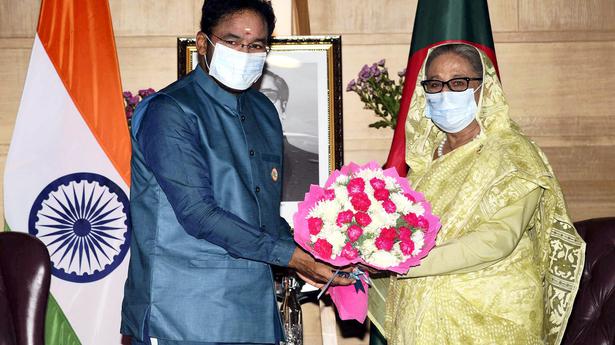India and Bangladesh have welcomed the establishment of a joint technical committee that will study the use of the Ganga waters in Bangladesh, a joint statement issued on the third day of the visit of Prime Minister Sheikh Hasina has announced. The technical committee on the Ganga is one of the several initiatives that the two sides announced that included several major connectivity and energy initiatives.
“The leaders welcomed the formation of a joint technical committee to conduct a study for optimum utilisation of water received by Bangladesh under the provisions of the Ganges Water Sharing Treaty, 1996,” said the joint statement. The Ganga Water Sharing Treaty is a 30-year agreement which is expected to be reviewed or renewed in 2026. The Indian side also raised the “”urgent” irrigation-related requirements in Tripura which can be addressed with the waters of the Feni and urged Bangladesh for “early signing of the interim water sharing agreement” on the river.
Also read | Bangladesh shares wish list of military hardware for procurement from India
Prime Minister Narendra Modi and Sheikh Hasina reviewed the upcoming bilateral connectivity initiatives such as the conversion to dual-gauge of Tongi-Akhaura line, supply of rolling stock, Kaunia-Lalmonirhat-Mogalhat-New Gitaldaha link and Hili-Birampur upgradation of track. Similar works are also on on the Benapole-Jashore and Burimari-Changrabandha lines. These multiple rail track projects will create a smooth flow of goods and people within Bangladesh overcoming infrastructure bottlenecks. India and Bangladesh have been in talks for the construction of an Inland Container Depot (ICD) at Sirajganj in the north-west of capital Dhaka and help in movement of bulk items.
Both the delegations appreciated the growth in bilateral trade but Bangladesh sought “predictable” supply of “essential food commodities …. such as rice, wheat, sugar, onion, ginger and garlic.” Disruption in the supplies of essential commodities has a potential to create unrest in Bangladesh which is also dealing with the current global “commodities shock.”
Connecting power grids
Both sides also took steps to connect the energy supply lines and make them synchronous. The leaders “agreed to expeditiously implement” projects to connect the power grids of both sides through the proposed high capacity 765 KV transmission line from Katihar in Bihar to Bornagar in Assam through Parbatipur in Bangladesh. Bangladesh asked greater support from India to import power from Nepal and Bhutan and the Indian side “informed that the guidelines for the same are already in place”. The two delegations also reviewed the progress of the India-Bangladesh Friendship Pipeline which will further boost energy supply in Bangladesh, which is currently dealing with a spike in energy prices.
The joint statement mentioned that the Prime Ministers of both sides emphasised that the project should be completed at the “earliest”. “The Bangladesh side also requested the Indian side to assist in meeting its domestic requirement for petroleum products. The Indian side agreed to facilitate discussions between the authorised agencies of both sides,” said the statement.
Also read | With Bangladesh PM in Delhi, Hilsa arrives in Kolkata’s markets
Medical facilities
Bangladesh expressed its deep appreciation for the medical facilities that India continues to provide for the Muktijodhas or the freedom fighters of 1971. It was decided that Bangladesh will send a large delegation of start-up entrepreneurs to India later this year to “stimulate partnership” between the new generation of industrialists and budding business groups.
In a separate event, Ms. Hasina awarded the Mujib scholarships to 200 descendants of the Indian soldiers who were martyred or injured in the 1971 Liberation War. She will travel to Ajmer Sharif on Thursday and leave for Dhaka after that.




